CCNA – Troubleshooting 1
Here you will find answers to Trouble Shooting Questions (Part 1)
Question 1:
Refer to the exhibit. The network administrator is in a campus building distant from Building B. WANRouter is hosting a newly installed WAN link on interface S0/0. The new link is not functioning and the administrator needs to determine if the correct cable has been attached to the S0/0 interface. How can the administrator accurately verify the correct cable type on S0/0 in the most efficient manner?
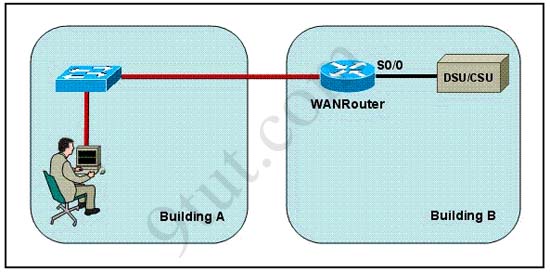
A. Telnet to WANRouter and execute the command show interfaces S0/0
B. Telnet to WANRouter and execute the command show processes S0/0
C. Telnet to WANRouter and execute the command show running-configuration
D. Telnet to WANRouter and execute the command show controller S0/0
E. Physically examine the cable between WANRouter S0/0 and the DCE.
F. Establish a console session on WANRouter and execute the command show interfaces S0/0
Answer: D
Explanation:
The show controller command displays the information about the physical interface itself and the type of serial cable plugged into a serial port. In this case, it should be a DTE cable that plugs into a type of data service unit (DSU).
For your understanding, below is the output of this command:

From the output, we notice that serial 0/0 has a DTE cable and would get its clocking from the DSU.
Question 2:
Two routers named Atlanta and Brevard are connected by their serial interfaces as shown in the exhibit, but there is no data connectivity between them. The Atlanta router is known to have a correct configuration. Given the partial configurations shown in the exhibit, what is the problem on the Brevard router that is causing the lack of connectivity?
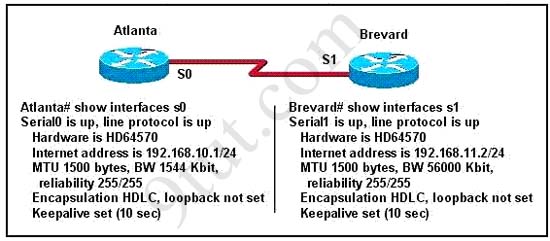
A. A loopback is not set
B. The IP address is incorrect.
C. The subnet mask is incorrect.
D. The serial line encapsulations are incompatible.
E. The maximum transmission unit (MTU) size is too large.
F. The bandwidth setting is incompatible with the connected interface.
Answer: B
Question 3:
Refer to the exhibit. The two exhibited devices are the only Cisco devices on the network. The serial network between the two devices has a mask of 255.255.255.252. Given the output that is shown, what three statements are true of these devices? (Choose three)
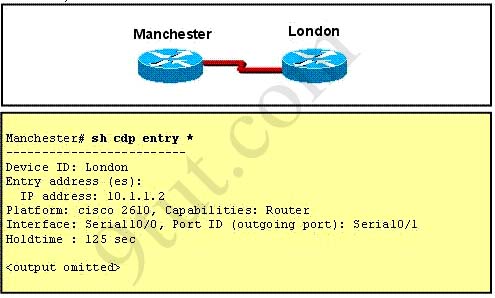
A. The Manchester serial address is 10.1.1.1.
B. The Manchester serial address is 10.1.1.2.
C. The London router is a Cisco 2610.
D. The Manchester router is a Cisco 2610.
E. The CDP information was received on port Serial0/0 of the Manchester router.
F. The CDP information was sent by port Serial0/0 of the London router.
Answer: A C E
Explanation:
From the output, we learn that the IP address of the neighbor router is 10.1.1.2 and the question stated that the subnet mask of the network between two router is 255.255.255.252. Therefore there are only 2 available hosts in this network (22 – 2 = 2). So we can deduce the ip address (of the serial interface) of Manchester router is 10.1.1.1 -> A is correct
The flatform of the neighbor router is cisco 2610, as shown in the output -> C is correct
Maybe the most difficult choice of this question is the answer E or F. Please notice that “Interface” refers to the local port on the local router, in this case it is the port of Manchester router, and “Port ID (outgoing port)” refers to the port on the neighbor router -> E is correct.
Question 4:
A network administrator has configured two switches, named London and Madrid, to use VTP. However, the switches are not sharing VTP messages. Given the command output shown in the graphic, why are these switches not sharing VTP messages?
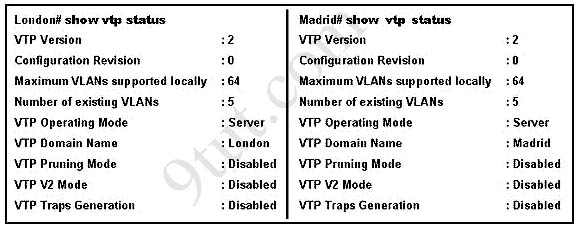
A. The VTP version is not correctly configured.
B. The VTP operating mode is not correctly configured.
C. The VTP domain name is not correctly configured.
D. VTP pruning mode is disabled.
E. VTP V2 mode is disabled.
F. VTP traps generation is disabled.
Answer: C
Explanation
In the exhibit, the Domain Names of 2 switches are mismatched (one is “London” and the other is “Madrid”) so these switches do not share VTP messages -> The VTP domain name is not correctly configured. Notice that the Domain Names should be the same on both switches to share VTP messages.
Question 5:
The network shown in the diagram is experiencing connectivity problems. Which of the following will correct the problems? (Choose two.)
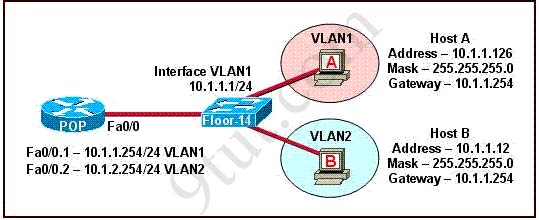
A. Configure the gateway on Host A as 10.1.1.1.
B. Configure the gateway on Host B as 10.1.2.254.
C. Configure the IP address of Host A as 10.1.2.2.
D. Configure the IP address of Host B as 10.1.2.2.
E. Configure the masks on both hosts to be 255.255.255.224.
F. Configure the masks on both hosts to be 255.255.255.240.
Answer: B D
Question 6:
Refer to the exhibit:
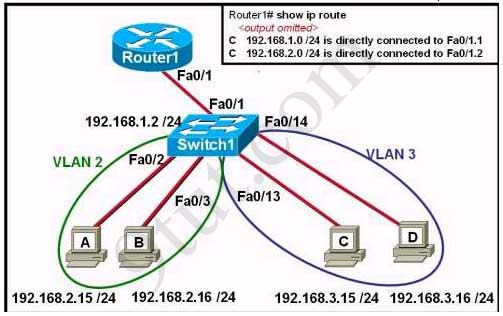
The network administrator has created a new VLAN on Switch1 and added host C and host D. The administrator has properly configured switch interfaces FastEthernet0/13 through FastEthernet0/24 to be members of the new VLAN. However, after the network administrator completed the configuration, host A could communicate with host B, but host A could not communicate with host C or host D. Which commands are required to resolve this problem?
A. Router(config)# interface fastethernet 0/1.3
Router(config-if)# encapsulation dot1q 3
Router(config-if)# ip address 192.168.3.1 255.255.255.0
B. Router(config)# router rip
Router(config-router)# network 192.168.1.0
Router(config-router)# network 192.168.2.0
Router(config-router)# network 192.168.3.0
C. Switch1# vlan database
Switch1(vlan)# vtp v2-mode
Switch1(vlan)# vtp domain cisco
Switch1(vlan)# vtp server
D. Switch1(config)# interface fastethernet 0/1
Switch1(config-if)# switchport mode trunk
Switch1(config-if)# switchport trunk encapsulation isl
Answers: A
Question 7:
Refer to the exhibit. Hosts on the same VLAN can communicate with each other but are unable to communicate with hosts on different VLANs. What is needed to allow communication between VLANs?
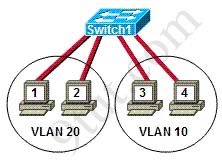
A. a switch with a trunk link that is configured between the switches
B. a router with an IP address on the physical interface that is connected to the switch
C. a switch with an access link that is configured between the switches
D. a router with subinterfaces configured on the physical interface that is connected to the switch
Answer: D
Question 8:
The show interfaces serial 0/0 command resulted in the output shown in the graphic. What are possible causes for this interface status? (Choose three)
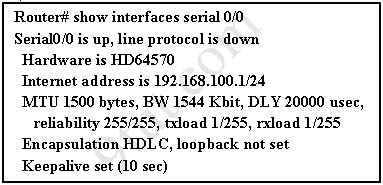
A. The interface is shut down.
B. No keepalive messages are received.
C. The clockrate is not set.
D. No loopback address is set.
E. No cable is attached to the interface.
F. There is a mismatch in the encapsulation type.
Answer: B C F
Question 9:
While troubleshooting a connectivity issue from a PC you obtain the following information:
Local PC IP address: 10.0.0.35/24
Default Gateway: 10.0.0.1
Remote Sever: 10.5.75.250/24
You then conduct the following tests from the local PC:
Ping 127.0.0.1 – Successful
Ping 10.0.0.35 – Successful
Ping 10.0.0.1 – Unsuccessful
Ping 10.5.75.250 – Unsuccessful
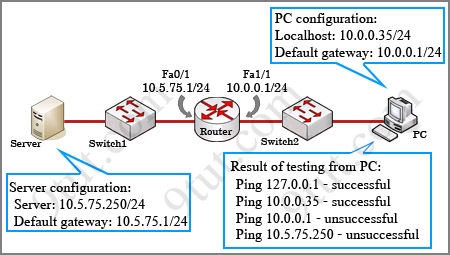
What is the underlying cause of this problem?
A. A remote physical layer problem exists.
B. The host NIC is not functioning.
C. TCP/IP has not been correctly installed on the host.
D. A local physical layer problem exists.
Answer: D



@ ptrck
then can we use the trunk port ?
Yes, I would think that the next option would be to verify if the int fa0/0 on the switch is configured as a trunk. Kind of a tricky question because in theory you need to have the fa0/0 on the switch configured as a trunk.
But if we get back to the question, routing with sub-interfaces is required first for vlans to talk to each other.
thank you
any1 tell me is this tut9 questions still valid???????????
pl help me out
Question 3:
In Pass4sure v17.14 the answer to the q3 is A C F
But in vcem the answer to the question is A C E
Here it’s A C E
So i’m going for A C E
some one send me latest Dumps For CCNA exam on my Email Id: Lucky_4_ever_91@yahoo.com
plzzzzzzzzzzzzzzzzzzzzzzzzzzzz
im thanks ful
please anybody send me latest Dumps for CCNA, my mail bebro4@yahoo.com
Please send me the latest dumps for the CCNA. The more labs you have the BETTER!
odoyle22@hotmail.com
Explanation for question 9:
Ping to 127.0.0.1 or loopback. If you can ping this address then TCP/IP is working properly on your device. If you cannot ping this, then there is a problem with your TCP/IP protocols.
Ping to your own IP address. If you can ping this IP address then there is no problem between you and the switch. You are sending the ICMP frame to the switch and the switch is sending it back to you. If you cannot ping your own IP, then there is a problem between you and the switch (switch, cabling, or NIC)
Ping to your default gateway. If you can ping this IP address then there is no problem between you and the default gateway. If you cannot ping this address then there is a problem somewhere between you and the default gateway.
In this example, we were able to ping our loopback (TCP/IP working), we were able to ping our own interface (switch, cabling to switch, NIC are all good), but we were not able to ping the router (problem between router and switch). Because this lies on the same network, it is considered to be “LOCAL” (hence LAN = local area network).
A. A remote physical layer problem exists.- NO, the problem is not on the remote side of the Router, it is a LOCAL AREA NETWORK connectivity problem
B. The host NIC is not functioning. – NO, we can ping our own IP address, that means that the NIC, cabling to switch and switch are good.
C. TCP/IP has not been correctly installed on the host. NO, we can ping our loopback, TCP/IP is good.
D. A local physical layer problem exists. YES – there is a connectivity problem between the switch and router
Explanation for question 8:
Serial0/0 is … – This tells us the physical state of the interface. Up means there is a working physical connection to a neighboring device. Down means there is a physical connection problem to the neighboring device. Administratively down means that the interface is manually shutdown.
Serial0/0… line protocol is – Line Protocol is Layer 2 and is monitored with keepalives. Up means that the interface is receiving keepalives from the other DCE/DTE device. Down means that the device is configured to receive keepalives, but is not receiving keepalives (problem can be: encapsulation mismatch, clockrate mismatch)
NOTE: if you disable keepalives with (config-if)#no keepalive then line protocol will ALWAYS be up, whether encapsulation/speed is correct or not.
In this example we see that Serial0/0 is up physically but the line protocol is down AND that keepalives have been set to 10seconds. This router is expecting keepalives on layer 2 but is not receiving them. The problem has to do with encapsulation or speed mismatch.
A. The interface is shut down. NO – this would show ‘Serial0/0 is administratively down’
B. No keepalive messages are received. YES – The router is configured for keepalives, however because it is not receiving them, line protocol is set to down.
C. The clockrate is not set. YES – possible that the clock rate is not configured correctly on the DCE (clocker). If the DCE clocking is not configured, there is no bandwidth on the line and the keepalives will not be transmitted or received.
D. No loopback address is set. NO – loopbacks have nothing to do with connectivity
E. No cable is attached to the interface. NO – if the cable was not connected we would show ‘Serial0/0 is down’. this would be a layer 1 problem
F. There is a mismatch in the encapsulation type. YES – if there is a mismatch of the encapsulation types, when one side encapsulates the frame and sends it, the other side will not know what it received. You send x, it is expecting y, drops the packet. This can cause keepalives to not be received.
thanks thanks and thanks a lot 4 giving me a useful resource …………wish u all the best dear
some one send me latest Dumps For CCNA exam on my Email Id: sayeedshah69@yahoo.com plz plz plz……………
im thanks ful
can any1 explain q5…
Which command reveals the last method used to powercycle a router?
1. Show relaod 2. Show boot 3.Show running-config 4.Show version
answer is show version . Can anyone explain what is powercycle and its relation with show version
Thanks
Miki
Comment on Q5, why do we need to configure the subnet mask for both networks as 255.255.255.248, when they are on 2 separate network VLAN 1 is at 10.1.1.0/24 and VLAN 2 is at 10.1.2.0/24 whats wrong with a full Class C ?
Question 9
Answer is D (a local physical layer problem) because the ping result is unsuccessful
But:
if the result was (Unreachable destination) then the Answer would be A (a remote physical layer problem).
can anyone help me to find the correct answer to this question.
A network technician analyzes the network and notices late collisions. The collisions occur accompanied by jabber that originates from the server. What is the likely cause of the problem?
1. faulty switch port
2. web server CPU overload
3. faulty NIC in the web server
4. misconfiguration of web server services
can anyone help me to find the correct answer to this question.
“A network technician analyzes the network and notices late collisions. The collisions occur accompanied by jabber that originates from the server. What is the likely cause of the problem?
1. faulty switch port
2. web server CPU overload
3. faulty NIC in the web server
4. misconfiguration of web server services”
the answer is 2. web server CPU overload
Sorry, the answer is “3. faulty NIC in the web server.” Faulty network interface cards (NICs) can be the cause of network transmission errors due to late collisions, short frames, and jabber. Jabber is often defined as the condition in which a network device continually transmits random, meaningless data onto the network. Other likely causes of jabber are faulty or corrupt NIC driver files, bad cabling, or grounding problems.
Question 2, the subnet mask can also be incorrect. change subnet to /23 and both hosts would be on the same network.
Address: 192.168.10.1 11000000.10101000.0000101 0.00000001
Netmask: 255.255.254.0 = 23 11111111.11111111.1111111 0.00000000
Wildcard: 0.0.1.255 00000000.00000000.0000000 1.11111111
Network: 192.168.10.0/23 11000000.10101000.0000101 0.00000000
HostMin: 192.168.10.1 11000000.10101000.0000101 0.00000001
HostMax: 192.168.11.254 11000000.10101000.0000101 1.11111110
Broadcast: 192.168.11.255 11000000.10101000.0000101 1.11111111
Hosts/Net: 510 Class C, Private Internet
sorry ignore the above comment… Question states: “The Atlanta router is known to have a correct configuration.”
If anyone has the latest dumps please send to frankereyes@hotmail.com. Thanks
hi Every body ,my Exam after 2 days ,i study well but am afraid too can any body send me the last dumps ,i will be thankfull
hassan_salamah@hotmail.com
pleasesend me latest ccna dumps,my mail :roshithamanju@yahoo.com
Passed the CCNA exam today – Philippines 920/1000 – thank you so much 9tut, acme, mashti, and examcollections, and to my trainer..
Simulations are the same – VTP, ACL and EIGRP.
A lot of questions were not from the dumps.. our of the 356 dumps, only 5 – 10 questions were included. The most important is that you know the concept. 9tut Rocks…
goodluck to all CCNA aspirants :) time to sleep after 3 months of lack of sleep lol
hi my friends i passed my exam today with a score 900 iam really happy :) ,i wish the best for everyone ,thanx 9tut ,all simulation came frome this site excipt ACL they add a new commands but you can deal with it simply ,alot of drag & drop came frome here too ,but you should solve any dumps you have especially last one ,good luck for all
please send me the latest dumps of CCNA
thanx in advance
arvind_verma26@rediffmail.com
can anybody send me the latest CCNA dumps.. i’m doing my exam in next week…
thanks..!!!
tithirawickmal@ymail.com
Can anyone please send me the latest CCNA dumps. Thank you in advance.
biniadam@hotmail.co.uk
May god help us to share our knowledge and contribution towards benefit of mankind!!!!!!!!!!!.This shows we have already initiated and hope it will pickup very swiftly….
Regards,
Syed Nizam
Im gonna take the CCNA exam on 9 July 11. Can any kind soul send the latest dump to my email add: aken31@hotmail.com. thanks alot. Greatly appreciated!
Thank you so much!
In question no. 3 why the answer is E, not F? pls. explain me.
team,
please send me the latest CCNA Dumps to Srinivas_Munagal@yahoo.com.. Thanks
Can anyone please send me the latest CCNA dumps
samirhalim24@yahoo.fr
Pessoal bom dia,
Por favor, gostaria de receber algumas dicas para prova CCNA, pois vou fazer a mesma ainda este mês.
Agradecimentos piva@interfacetec.com.br
please send me the latest CCNA dumps
amogh.coolperson@gmail.com
@Floccinaucinihilipilification
See in this Q3 there is great confusion..but wat doez d question says is “Given the output that is shown, what three statements are true of these devices?”
Please notice that “Interface” refers to the local port on the local router, in this case it is the port of Manchester router, and “Port ID (outgoing port)” refers to the port on the neighbor router -> E is correct.
and the port serial 0/0 is not the port of the london router to which to which the manchester router is connected…
anonymous
how was your exam? and you had what kind of sim questions?
Hi, Appreciate if someone could send me the latest dumps at treepanel.ken@hotmail.com , i plan to take the exams at the end of sep.
Thanks.
Hi all! can someone send me the latest CCNA actual exam?
please send it to bny521@yahoo.com
Appreciate anyone who will share it. Thanks!
can someone explain qn 6?
@pasto: In Q6 – answer is A:
Admin add new VLAN, configured switch interfaces and assign port to new VLAN. New VLAN = separate broadcast domain = separate subnet. If you need to send packets in another subnet – you need to route them. So we need to make some configurations on the router, i.e. add new subinterface on FA 0/1
Router(config)#int f0/1.3
Assign IP address (it will be gateway hosts in the VLAN3)
Router(config-if)#ip add 192.168.3.1 255.255.255.0
Specify the encapsulation (in this case may be only 802.1.q) and VLAN
Router(config-if)#encapsulation dot1.q 3
Answer B: Router automatically will routing packets for directly connected networks. We haven’t to configure routing protocol. So answer is wrong.
Answer C: Describes configuring of VTP. We dont’t need it in this case. So it’s wrong.
Answer D: Describes configuring trunk link but for the trunk link between router and switch we have to use encapsulation 802.1q (i.e. switchport trunk enc dot1q). So it’s wrong too.
That’s all…
@pasto:
Sorry for a little mistyping. Should be:
Router(config-if)# encapsulation dot1q 3
without “.” in keyword “dot1q”.
please, some one explain me better (elaborately) Q. no. 8.
Thank-you in advance.
@big man big mind
A. The interface is shut down.
then we would see “down/administratively down”. false
B. No keepalive messages are received.
could be a cause for the L2 problem – the router at the other end is not communicating with this router. true
C. The clock rate is not set.
could be a cause for the L2 problem – the router which is the DCE is not configured with a clock rate. true
D. No loopback address is set.
“loopback address” is a L3 concept. not our concern. false
E. No cable is attached to the interface.
“Serial 0/0 is up …” this means that the connection is working at L1 (a proper cable is used). false
F. There is a mismatch in the encapsulation type.
this router is using the default cisco serial encapsulation protocol (HDLC). if the router at the other end is using PPP then we’d have an encapsulation mismatch. true
Q2. What is the problem that is causing lack of connectivity?
Option2. IP address is incorrect.
Can anyone please elaborate? Thanks
@Anonymous: We begin to resolve connectivity problem from the lowest OSI level.
1. Router Atlanta: S0 is up, Line prot is up. So the problem isn’t in L1 or L2 (Physical and Channel levels).
2. Router Brevard: S1 is up, line prot is up. So the problem isn’t in L1 or L2.
3. Atlanta S0 ip adddress: 192.168.10.1/24 and we know Atlanta configured correctly. Ok.
Lets look IP address for S1 interface on Brevard: 192.168.11.1/24
In the third octet we have “11″ instead of “10″. So the answer is B: The IP address is incorrect.
pleas ,could any one help me i can’t open vce files ,Although i install visual_certexam_suite_setup
9tut
Regarding Q2
answer B
Why is it the ip address is incorrect? What should be the correct ip address for Brevard?